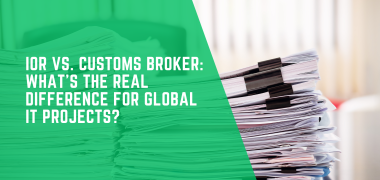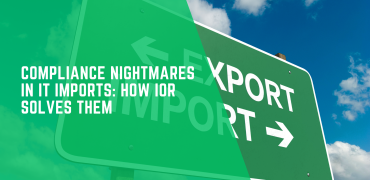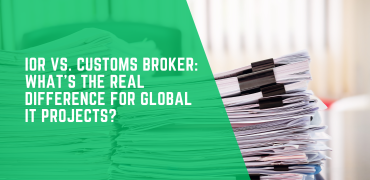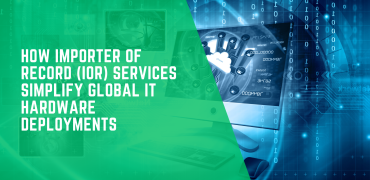In today’s hyperconnected, tech-driven economy, global IT projects are no longer optional — they are foundational to business continuity, digital transformation, and competitive edge. However, as enterprises deploy infrastructure across borders, they encounter a shared barrier: the labyrinth of import regulations, customs documentation, and local compliance. Two roles often emerge in this space — the Importer of Record (IOR) and the Customs Broker.
Though often misunderstood or used interchangeably, they serve very different functions. Understanding the distinction between the two is critical for IT and telecom companies that want to scale globally without delays, penalties, or regulatory missteps.
In this blog, we break down:
-
The core functions of IORs vs. Customs Brokers
-
When and why each is needed
-
Key differences for global IT deployments
-
The strategic advantage of working with a dedicated IOR like ASL Importer of Record
📦 Global IT Projects: High Stakes, Higher Complexity
From setting up remote offices to deploying data centers and edge computing solutions, global IT projects involve moving sensitive, high-value hardware like:
-
Servers, switches, and routers
-
Network and telecom equipment
-
Laptops, storage devices, and peripherals
-
Secure communications and IoT gear
Shipping these across borders is not just about freight — it’s about compliance with local import laws, customs regulations, and certifications. Even one mistake in documentation can lead to:
-
Shipment seizure or return
-
Financial penalties
-
Project delays
-
Loss of business reputation
This is where IORs and Customs Brokers come into play — but they’re not the same solution.
🔍 What Is a Customs Broker?
A Customs Broker is a licensed professional or agency authorized to handle the submission of customs documentation and payment of duties on behalf of an importer.
✅ Key Responsibilities:
-
Filing import/export declarations
-
Classifying goods under Harmonized Tariff Codes (HTS)
-
Calculating and paying duties, VAT, and taxes
-
Coordinating with customs officials for clearance
❌ What a Customs Broker Cannot Do:
-
Act as the legal importer for foreign companies
-
Own or take responsibility for the imported goods
-
Handle compliance certification, import licenses, or telecom authorizations
In short: A customs broker facilitates the process of import but does not assume legal responsibility for it.
🧾 What Is an Importer of Record (IOR)?
An Importer of Record (IOR) is a legal entity or service provider authorized to import goods into a country on behalf of another company, especially when that company does not have a local entity.
✅ Key Responsibilities:
-
Taking full legal ownership of imported goods
-
Ensuring compliance with all local import regulations
-
Obtaining certifications and permits (e.g., telecom, data, safety)
-
Filing declarations and managing documentation
-
Paying all duties, taxes, and applicable fees
-
Representing the foreign company to local customs authorities
In essence: An IOR is responsible for the entire legal and compliance aspect of the import, not just its paperwork.
⚖️ IOR vs. Customs Broker: Key Differences at a Glance
| Function | Customs Broker | Importer of Record (IOR) |
|---|---|---|
| Legal Responsibility | No | Yes |
| Can Import on Behalf of Foreign Entity | No | Yes |
| Handles Compliance Documentation | Partial (customs only) | Full (certifications, licenses, etc.) |
| Pays Duties and Taxes | Yes (on behalf of the importer) | Yes (as the responsible party) |
| Suitable for Non-Resident Importers | No | Yes |
| Provides Certifications (e.g. telecom) | No | Yes |
| Manages End-to-End Import Compliance | No | Yes |
🛠️ Why This Matters for Global IT Projects
Tech deployments are not like retail shipments. They involve critical infrastructure, often bound by data regulations, telecom licensing, and hardware conformity rules. Here’s why depending solely on a customs broker is a costly mistake:
1. No Local Entity? No Entry.
If your company is based in the U.S. or Europe and you’re shipping servers to India, Brazil, or the UAE — you can’t clear those goods without being a registered entity in the destination country. A customs broker can’t solve that.
An IOR like ASL becomes your legal importer, enabling smooth clearance.
2. Non-Compliance Can Kill Projects
If you lack the right certifications (e.g., WPC in India, ANATEL in Brazil), your equipment can be seized. A customs broker won’t help you secure those permits.
An IOR will manage all compliance requirements end-to-end.
3. Multiple Markets = Multiple Complexities
Each country has unique telecom, tax, and import laws. Managing this through different brokers increases fragmentation.
An IOR like ASL offers a single point of contact across 150+ countries, reducing friction.
4. End-to-End Visibility
IORs don’t just handle clearance. At ASL, we also manage:
-
HS code classification
-
Cost forecasting (duties, VAT)
-
Documentation audits
-
Final-mile logistics and deployment (optional)
🌐 Where Customs Brokers Fall Short
Customs brokers are essential — but not sufficient — for global IT deployment. They can’t:
-
Act on behalf of a foreign, non-registered importer
-
Ensure compliance with technical regulations (especially in telecom-heavy markets)
-
Accept accountability if goods are rejected or flagged
For large IT shipments, relying only on a customs broker is like building a data center without a power source — necessary, but incomplete.
🚀 Why Leading Tech Firms Trust ASL Importer of Record
ASL specializes in high-stakes, high-value imports for the tech and telecom industries. Whether you’re shipping a single server rack to Singapore or a full-scale data center deployment to the Middle East, ASL ensures:
✅ Full Legal Representation
We act as your local IOR in over 150 countries — so you don’t need a local entity to import equipment compliantly.
✅ Regulatory Peace of Mind
From CE and WPC certifications to ANATEL and RoHS — we handle all compliance clearances before goods reach customs.
✅ Seamless Logistics Coordination
We collaborate with your freight forwarders, OEMs, and deployment teams to make sure every shipment moves smoothly, with zero clearance friction.
✅ Faster Time-to-Deploy
By eliminating compliance bottlenecks and documentation delays, we help accelerate project timelines — so your teams can go live faster.
🔄 When Do You Need Both?
While IORs and customs brokers are different, they often work together. In fact, many IORs, including ASL, partner with trusted brokers in each country to file documents efficiently — while we handle the legal and compliance burden.
Think of it this way:
-
IOR = Legal and compliance backbone
-
Broker = Documentation and execution layer
Together, they ensure a smooth, compliant, and timely import process.
📈 Final Thoughts: Choose the Right Partner for Global IT Success
In the world of global tech deployments, speed, accuracy, and compliance aren’t optional — they’re essential. Misunderstanding the difference between a customs broker and an IOR can lead to costly consequences, from project delays to legal issues.
For non-resident importers, high-value equipment, or markets with complex compliance requirements, working with a dedicated IOR like ASL Importer of Record isn’t just smart — it’s mission-critical.




